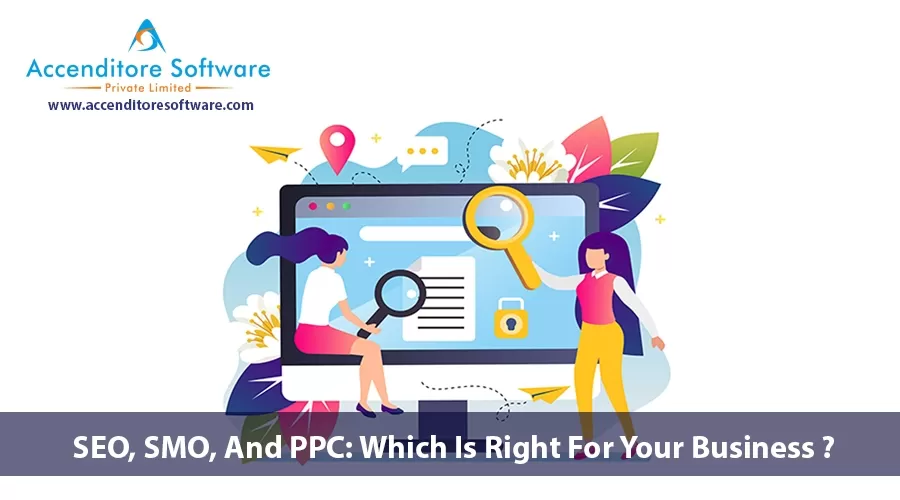
SEO, SMO, And PPC: Which Is Right For Your Business?
In the vast and ever-changing world of digital marketing, businesses are constantly seeking ways to increase their online visibility and reach their target audience effectively. Three popular strategies that often come up in this pursuit are Search Engine Optimization (SEO), Social Media Optimization (SMO), and Pay-Per-Click (PPC) advertising. Each of these approaches offers distinct benefits and can be highly effective when used strategically. In this blog, we will explore the differences and advantages of SEO, SMO, and PPC to help you determine which one is right for your business.
- Search Engine Optimization (SEO):
SEO is the process of optimizing your website to improve its visibility on search engine results pages (SERPs) organically. This involves understanding and implementing various techniques to rank higher for relevant keywords, attract organic traffic, and increase the overall quality and relevance of your website.
Advantages of SEO:
a. Cost-Effectiveness: SEO is generally more cost-effective in the long run since the primary investment is in the optimization process. Once your website achieves a higher ranking, the ongoing maintenance and updates are relatively affordable.
b. Long-Term Results: Though it may take time to see significant results, SEO efforts can lead to sustainable, long-term visibility on search engines, providing a steady flow of organic traffic over time.
c. Credibility and Trust: Websites that rank higher in organic search results are often perceived as more credible and trustworthy by users.
d. Better User Experience: SEO involves optimizing your website for a better user experience, which can lead to higher engagement, longer sessions, and increased chances of conversions.
- Social Media Optimization (SMO):
SMO focuses on utilizing social media platforms to increase brand visibility, engage with the target audience, and drive traffic to your website. This strategy involves creating and sharing content on social media channels, interacting with users, and building a community around your brand.
Advantages of SMO:
a. Wider Reach and Engagement: Social media platforms have massive user bases, making it an excellent avenue to reach a broader audience and engage with potential customers.
b. Brand Awareness: SMO helps in building brand awareness, as your content can be easily shared and liked by users, increasing the chances of it going viral.
c. Real-Time Interaction: Social media allows you to interact with your audience in real-time, respond to queries, and build a more personalized connection with customers.
d. Targeted Advertising: Many social media platforms offer sophisticated targeting options for paid advertisements, enabling you to reach a specific audience based on demographics, interests, and behavior.
- Pay-Per-Click (PPC) Advertising:
PPC is a form of online advertising where advertisers pay a fee each time their ad is clicked. It allows businesses to bid on keywords and display their ads prominently in search engine results or on various websites, targeting specific audiences.
Advantages of PPC:
a. Immediate Results: Unlike SEO and SMO, PPC can drive instant traffic to your website as soon as your ads are approved and running.
b. Precise Targeting: With PPC, you have control over who sees your ads, ensuring that your message reaches the right people at the right time.
c. Measurable ROI: PPC platforms provide detailed analytics, allowing you to track the performance of your ads and measure the return on investment (ROI) accurately.
d. Flexibility and Control: You can easily adjust your PPC campaigns, budgets, and targeting parameters based on performance and business goals.
Choosing the Right Strategy for Your Business:
The most effective digital marketing strategy for your business depends on various factors, including your industry, target audience, budget, and marketing objectives. In many cases, a combination of these strategies can yield the best results.
-
If your business is looking for a long-term, sustainable approach that focuses on organic growth and increased credibility, SEO might be the way to go.
-
If your primary goal is to build brand awareness, engage with your audience, and foster a community around your brand, SMO can be highly beneficial.
-
If you seek immediate results, have a specific promotion or offer, and want precise control over your advertising spend, PPC could be the right choice.
In conclusion, a well-rounded digital marketing strategy often involves integrating elements of SEO, SMO, and PPC based on your business's unique needs and goals. It's essential to stay informed about the latest trends and best practices in the digital marketing landscape and adapt your approach accordingly to maximize the potential of each strategy. By leveraging the strengths of SEO, SMO, and PPC, your business can gain a competitive edge and thrive in the digital marketplace.
Write a Comments
Your email address will not be published. Required fields are marked*

0 Comments